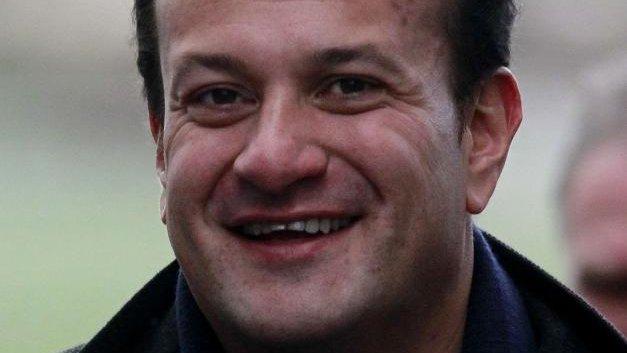The GP who became Ireland's youngest taoiseach
- Published
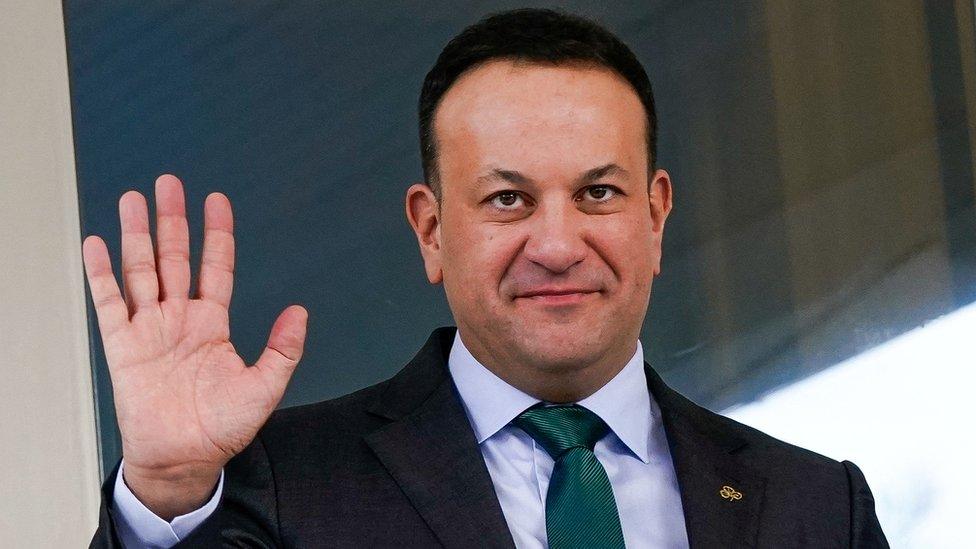
Leo Varadkar, who is stepping down at the age of 45, has served two terms as taoiseach (Irish prime minister)
Leo Varadkar, who is stepping down as Fine Gael leader and Irish prime minister, made history for lots of reasons when he became taoiseach.
The son of an Irish nurse and a Indian-born doctor, he was Ireland's youngest and first gay leader.
Now 45, he was just 38 years old when he was first taoiseach in 2017.
At the time, he was widely seen as embodying the liberalisation of a country once regarded as one of the most socially conservative in Europe.
He served twice as taoiseach in coalition governments - first from June 2017 to June 2020 and then again from December 2022.
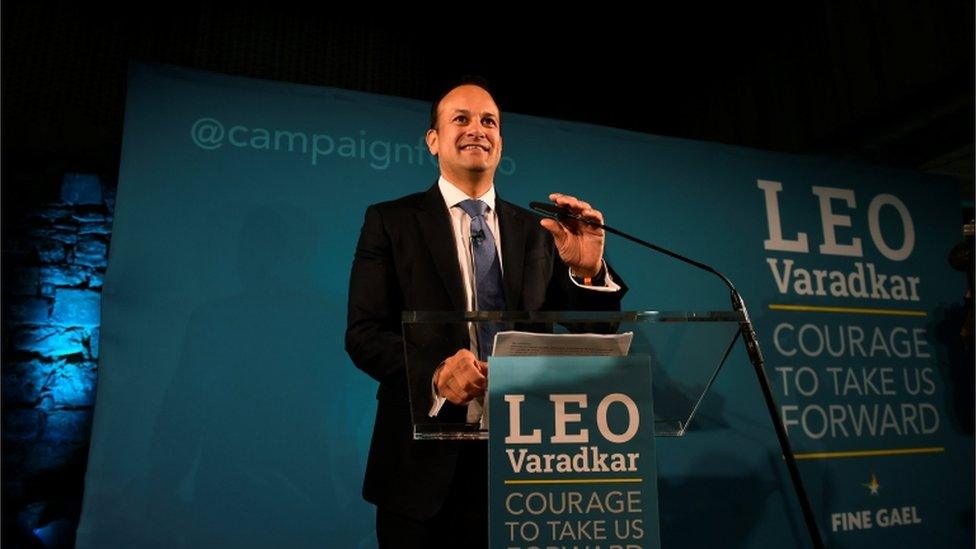
In 2015, he came out as gay in an interview with the Irish national broadcaster RTÉ
His first term was dominated by Ireland's bullish response to Brexit and insistence that no "hard border" could be re-imposed between Northern Ireland and the Republic of Ireland.
As the Covid-19 pandemic began to rapidly spread to Europe, Mr Varadkar's Fine Gael party lost seats in the general election in February 2020.
It took several months to form a new coalition government - with Fine Gael teaming up with its old Civil War rivals in the Fianna Fáil party to share power in an unusual "revolving taoiseach" deal.
The 2020 deal meant Mr Varadkar served half a government term as tánaiste (deputy prime minister), under Fianna Fáil leader Micheál Martin as taoiseach.
Then halfway through the government, the pair swapped roles and Mr Varadkar began his second term as taoiseach in December 2022.
Who is Leo Varadkar?
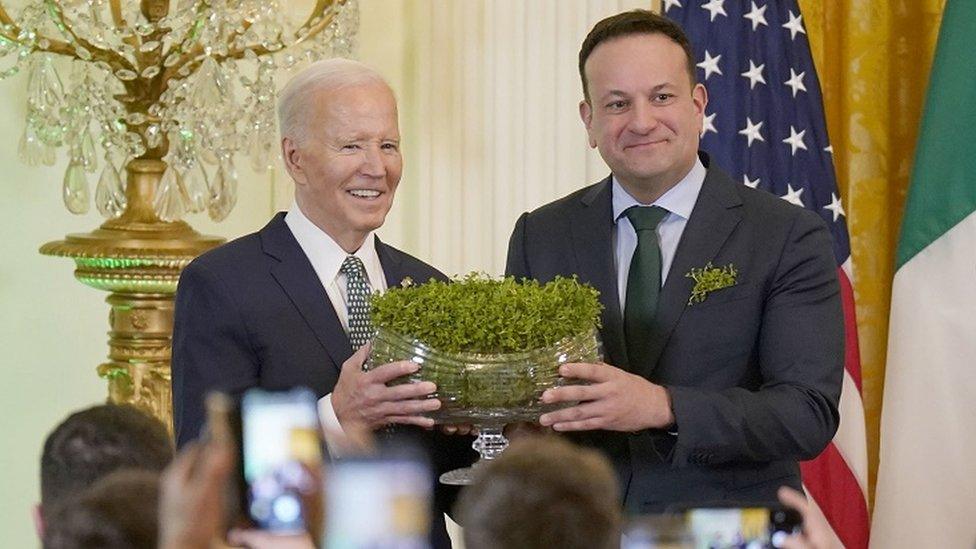
US President Joe Biden accepted a bowl of shamrock from Leo Varadkar on Sunday
The future Irish leader was born on 18 January 1979 in Dublin.
His father Ashok - a doctor from Mumbai - met his mother Miriam, an Irish nurse, while they were both working in Slough in Berkshire.
The couple settled in Ireland in the 1970s.
The country Mr Varadkar grew up in was very different to today.
Until the 1990s, homosexuality and divorce were illegal.
There were few immigrants, and the Republic of Ireland was one of the poorer members of the EU.
Mr Varadkar followed his father into medicine, qualifying as a GP in 2010.
He became a councillor aged 24 and, in 2007, he was elected to the Irish parliament, Dáil Éireann.
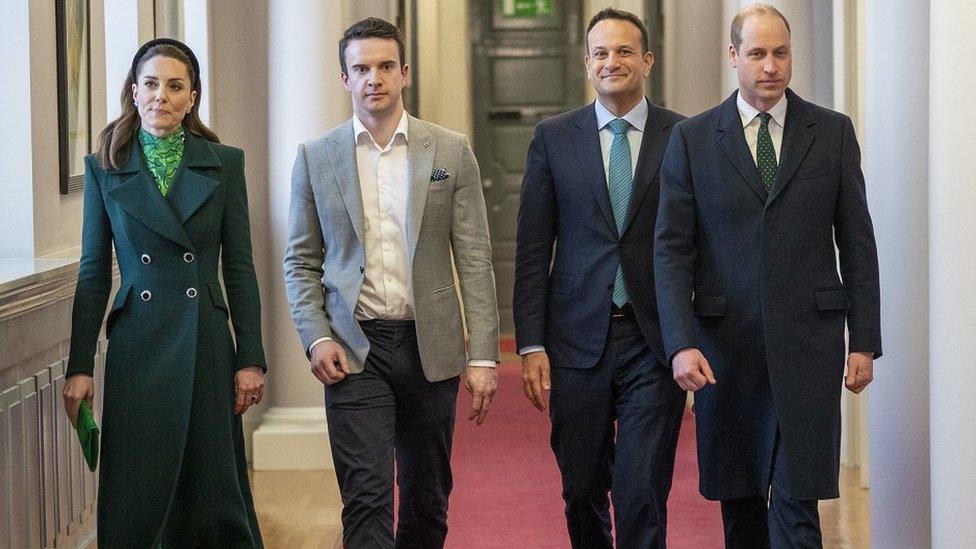
Leo Varadkar and his partner Matt Barrett welcomed Prince William and his wife Catherine to Dublin's Government Buildings in 2020
'Straight talker'
He rose to power after a turbulent decade of boom to bust.
Ireland's Celtic Tiger economy crashed spectacularly in 2007 amid the worldwide financial crisis, and the previous government had to accept a £71bn international bailout.
In the aftermath, Fine Gael came to power at the head of a coalition in 2011 and Mr Varadkar got his first ministerial appointment as transport, tourism and sport.
By 2014, the doctor had become Ireland's health minister.
He built up a high media profile - descriptions of him as a "sharp-shooter" and "straight-talker" were common.
In 2015, he came out as gay in an interview with the Irish national broadcaster, RTÉ.
"It's not a big deal for me any more. I hope it's not a big deal for anyone else - it shouldn't be," he said.
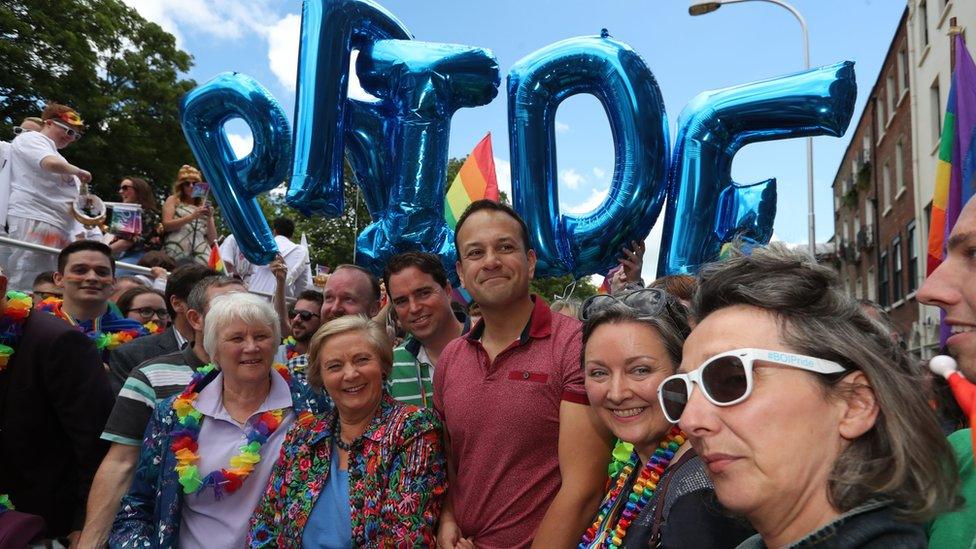
Leo Varadkar attended the 2017 Dublin Pride parade shortly after taking office
A few months later, Ireland voted in a referendum to legalise same-sex marriage.
In 2017, the then taoiseach Enda Kenny announced his retirement and Mr Varadkar won a leadership contest to replace him.
At the age of 38, he became Ireland's youngest prime minister.
Days after taking office, he attended Dublin's Pride Parade and promised to use his position to campaign for same-sex marriage in Northern Ireland.
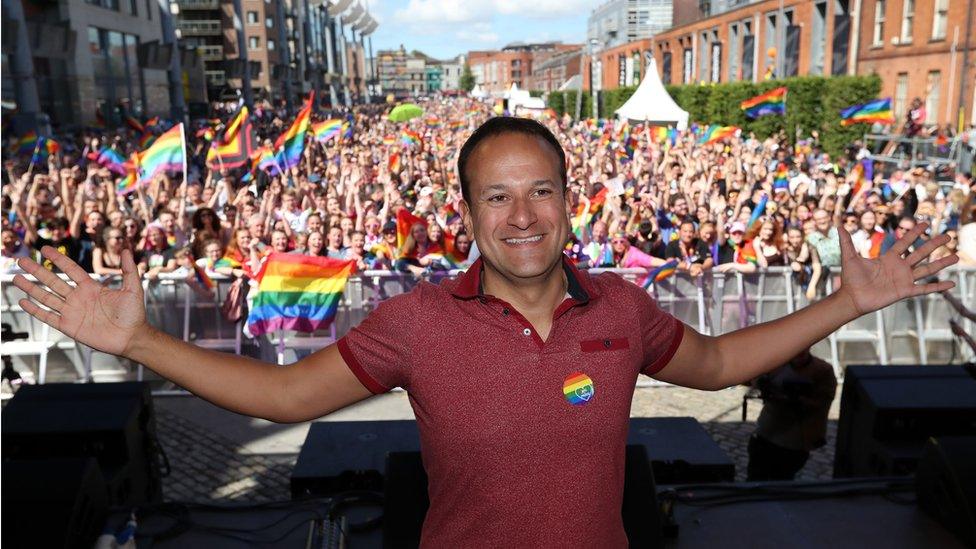
Leo Varadkar said he would use his office to promote gay rights around the world
Within his first year of taking office, the Irish electorate voted overwhelmingly to overturn the state's ban on abortion, repealing the Eighth Amendment of the Irish constitution by 66.4% to 33.6%.
Riots and referendums
His second term as taoiseach has been beset by problems including a cost of living crisis exacerbated by the war in Ukraine.
The Irish government has struggled to house thousands of Ukrainian refugees at a time when the country is experiencing a homelessness crisis.
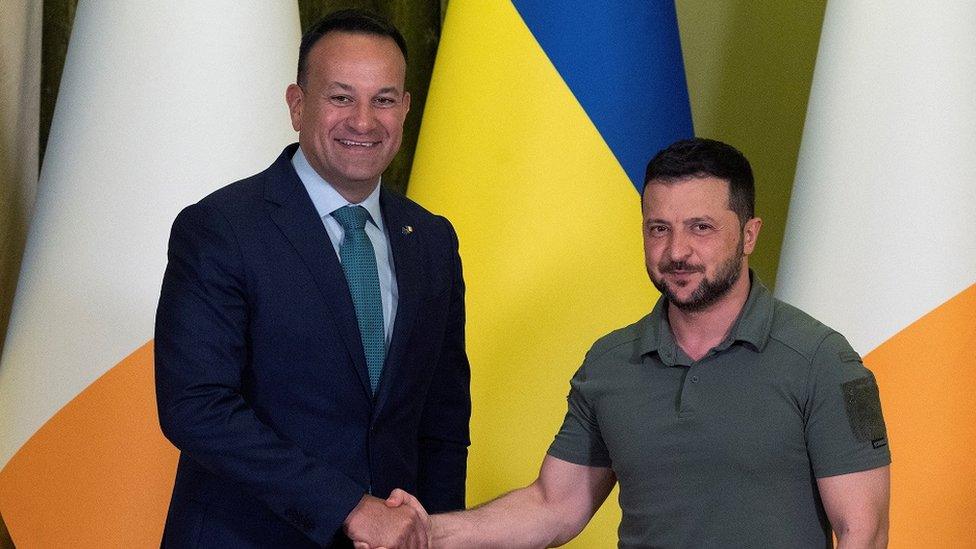
Leo Varadkar meeting Ukrainian President Volodymyr Zelensky in 2023
In November 2023, much of Dublin city centre was engulfed by serious rioting which was sparked by the stabbing of children outside a school.
It took the country's police force by surprise, and the government's response to the riot was widely criticised.
Earlier this month, Mr Varadkar's government suffered an embarrassing defeat when voters overwhelmingly rejected its bid to change the constitution through two referendums.
Proposals to alter wording in the constitution to include families which are not based on marriage were defeated with 67.7% voting no.
A second proposed change on the wording around the role of women in the home was defeated by a higher margin with 73.9% of voters rejecting it.
It was the highest ever no vote percentage in an Irish referendum.
Related topics
- Published20 March 2024
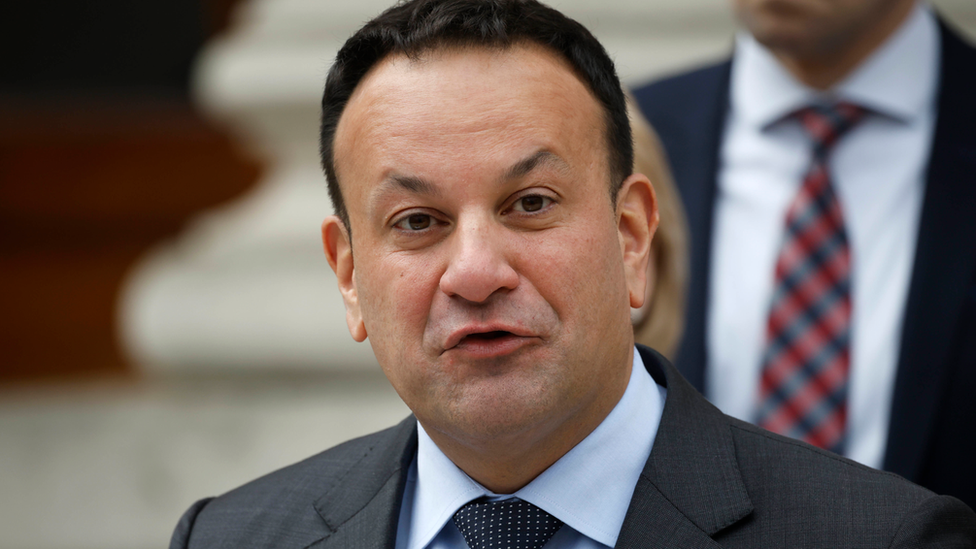
- Published9 March 2024
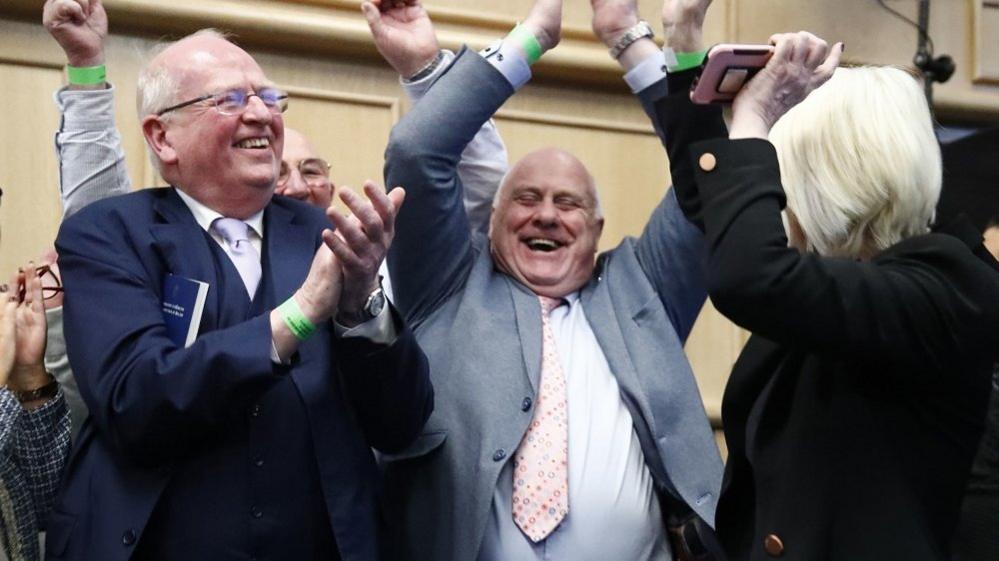
- Published18 January 2015
